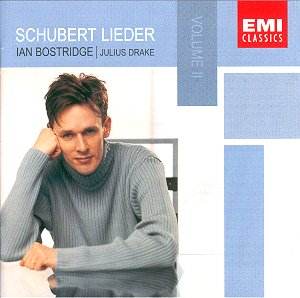
Crotchet
AmazonUK AmazonUS |
Franz SCHUBERT (1797-1828)
Lieder, volume 2: Lied eines Schiffers an die Dioskuren, D.360 Nachtstück, D.672 Auf der Donau, D.553 Abendstern, D.806 Auflösung, D.807 Geheimes, D.719 Versunken, D.715 Schäfers Klagelied, D.121 An die Entfernte, D765 Am Flusse, D. 766 Wilkommen und Anschied, D.767 Die Götter Griechenlands, D.677 An die Leier, D.737 AmSee, D.746 Alinde, D.904 Wehmut, D.772 Über Wildemann, D.884 Auf der Riesenkoppe, D. 611 Sei mir gegrüßt, D.741 Daß sie hier gewesen, D.D.775 Der Geistertanz, D.116 |
Ian Bostridge has risen to become one of the world's leading artists, particularly in the lieder repertory. Here is a second volume of Schubert from him, and it is an imaginatively drawn, distinctive programme performed to the highest standard.
There are twenty-one songs in all: with the first half of the recital shared between two favourite poets, Mayrhofer and Goethe, while the remainder are from various others among the hundred or so that Schubert used.
Bostridge responds to the texts with the utmost sensitivity and intelligence, using his remarkable tone control to convey the subtleties and feeling of each individual song. His plangent tone particularly suits Schubert's lieder, concentrating the mind of the listener through his effortlessly refined technique. Some might argue that a few of these songs benefit from the darker voice of a baritone, for example Willkommen und Abschied. But surely the point is that there is more than one way of realising them, and there is room for both. In any case the tenor's tone has developed a richer, more expressive range which enables him to respond to Schubert's darker moods in a really telling way. Take, for example, the atmospheric imagery of Mayrhofer's Nachtstück, which is delivered with extraordinary intensity of vision.
These things are easily taken for granted, but they are not easily achieved. Of course the interesting reviews of this disc will be from German-speaking critics: does Bostridge overcome the language-barrier? It seems to the English listener that he does, and since the disc comes with full texts and translations there is ample opportunity to pursue detailed study.
The EMI recording is warmly atmospheric, just right for allowing a natural perspective. A high point of the recital is the performance of Dass sei hier gewesen, one of the composer's most emotionally involving songs, and here as elsewhere Bostridge has excellent support from his accompanist, Julius Drake. Their collaboration is developing into one of the key features of their respective careers, a true partnership of equals.
While serious Schubert collectors will rightly maintain their loyalty to great artists like Dietrich Fischer-Dieskau, Janet Baker, Elisabeth Schumann and Hans Hotter, Ian Bostridge is surely worthy of a position in this illustrious gallery.
Terry Barfoot